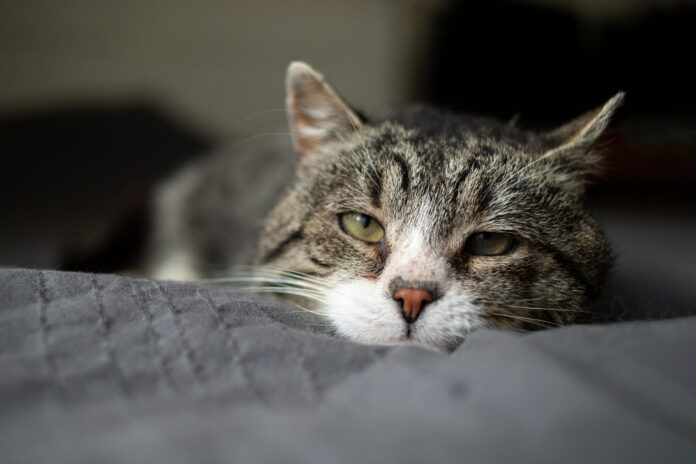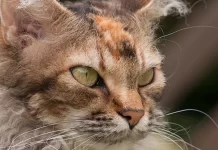Last Updated on August 17, 2023 by Fumipets
Signs Your Cat Is Dying: Understanding the Telltale Signals
Recognizing the signs that your beloved feline companion is approaching the end of its life is a heart-wrenching experience. As cat owners, it’s essential to be attuned to the subtle changes and behaviors that may indicate your cat is nearing the end of its journey.
In this sensitive exploration, we’ll delve into the signs that your cat may be dying and address some common questions that arise during this difficult time.
Cats
Our cats are members of our family, and we adore their regal appearance, lively paw boops, and deep-throaty purrs. But eventually, the two of you will have to part ways, and as cats are skilled at masking their suffering, this may often catch humans off guard.
Even though it may be very upsetting to see your cat suffering in any way, keeping an eye out for these signs can help you spot when your cat needs additional comfort and care. It may also enable you to spot problems early enough to improve your cat’s quality of life.
Signs Your Cat Could Be Dying
Cats are renowned for being adept at concealing wounds and diseases. This is a fantastic survival mechanism for cats in the wild since displaying any signs of weakness puts them vulnerable to attack from competitors and predators.
But when it comes to our beloved cats, this might be difficult for us caring parents who want to support our furry friends through any sickness or suffering. We need to keep a careful eye on our cats and be aware of any little changes that could be abnormal.
Many of the symptoms that indicate that your cat is reaching the end of her life are also typical markers of diseases including cancer, chronic renal disease, diabetes mellitus, hyperthyroidism, and chronic kidney disease. When you discover that your cat isn’t feeling well, the first thing you should do is have your veterinarian check her.
Your veterinarian can inform you whether your cat has a problem that can be treated or if the outlook is less favorable based on the examination and any diagnostic procedures that are carried out.
Extreme Weight Loss
In older cats, weight loss is fairly prevalent. Some of this may be attributed to natural muscle loss since as your cat matures, her body becomes less effective at breaking down and constructing protein, which results in muscular mass loss. Despite eating healthily, your cat may be losing weight.
The weight loss might escalate over time. Some elderly or ill cats may become so thin that their ribs, spines, and hip bones may be seen poking through the skin. Cancer-related cachexia is a specific kind of severe weight loss in which the body tears down its muscle and fat reserves for fuel because the rapidly proliferating cancer cells need so much energy. Cats with chronic renal illness and hyperthyroidism may lose weight as well.

Extra Hiding
Although it might be hard to explain, hiding is a clear indicator of disease in cats. Normally, a lot of cats want to hide. Watch out for behaviors like increasing hiding, hiding in unfamiliar areas, and refusing to emerge even for regular, pleasant occasions like meals.
Not Eating
Your cat may not want to eat if she’s feeling unwell. Some drugs may also affect your cat’s ability to taste and smell, which may reduce her appetite. To get her more interested in eating, try reheating her meal or drizzling a little tuna juice on top.
Additionally, your doctor may recommend certain drugs to aid in getting your cat to eat. The anti-emetic Cerenia may assist with nausea, while mirtazapine and other appetite stimulants might make your cat want to eat more.
It could be impossible to convince your cat to eat anything as she gets closer to dying away.
Not Drinking
Additionally, sick cats often show little interest in drinking, which may rapidly result in dehydration. If your cat is still eating, you may boost the amount of liquid she consumes by giving her canned food and/or water. In rare circumstances, you may be able to delicately spray her with water using an oral syringe or a squirt bottle.
Only pump a tiny quantity of water into your cat’s mouth at a time while you direct her snout downward. If you have her drink too much water at once, the water may enter her lungs and go into her trachea, which might lead to pneumonia and choking.
Lethargy
Your cat will likely become less active as her life draws to a close. She may get weaker as she snoozes more and more. Some cats could also come out as glum and listless.
Decreased Mobility
Senior cats often have less movement as a result of muscle loss, discomfort from conditions like arthritis, and other medical issues. Weakness often develops over time; it may start off tiny, like losing the ability to leap up onto the kitchen counter, but it may also become worse with time, making it difficult to navigate stairs or even to enter and exit a tall litter box.
Making sure your cat has easy access to everything she needs can benefit her. To securely access her favorite vantage points or resting spots, use ramps or stepping stones. Your veterinarian may recommend cat-safe pain relievers if your cat has arthritis in order to make her more comfortable.
Behavioral Changes
When they are about to pass away, cats may exhibit a variety of behavioral changes. Each cat will experience changes differently, but what is important is that she has altered her behavior.
Some cats may become more withdrawn, grumpy, and irritable as a result of discomfort or cognitive impairment. Other cats get cozier and friendlier as they develop a constant need for proximity to you.
Some cats have cognitive impairment, which is comparable to dementia in people. It’s possible for these cats to roam the home at night and to vocalize more than usual. They may also seem perplexed or disoriented in settings they are acquainted with.
Your cat can go missing for protracted lengths of time, skip meals, or adopt new sleeping habits.
Poor Response to Treatments
Many of the illnesses that afflict older cats may be managed for a very long period with medication and other therapies. Your cat could need greater dosages of medicine or cease responding to therapy over time. This can indicate that her body is deteriorating and is no longer able to use drugs as they should be.
Poor Temperature Regulation
Senior cats are more vulnerable to heat and cold than healthy adult cats because they are increasingly unable to control their body temperatures. Cats that are close to passing away often have low body temperatures, even when given a warm atmosphere and bed. The limbs of your cat could feel chilly to the touch.
Unkempt Appearance
Cats typically cease grooming themselves when they are ill. This results in a coat that looks dirty and oily. Mats may form on long-haired cats, especially on the back, abdomen, and behind the ears. Additionally, your cat can have dry skin and profuse dandruff.
If your cat is willing to put up with it, giving her a nice brushing might make her feel better.
Abnormal Odor
Your cat may start to smell strange as she gets closer to the end of her life. This is brought on by the body’s breakdown of tissues and accumulation of poisons. Depending on the precise underlying disease, the specific fragrance may change. Cats with renal failure may have ammonia-like breath, and diabetic ketoacidosis may cause them to smell sickeningly sweet.
Abnormal Breathing
As your cat matures, the muscles and nerves that regulate its lungs may start to deteriorate. A dying cat may have an irregular breathing pattern, with erratic peaks and valleys in her respiratory rate. She could even briefly stop breathing before picking it back up again.
Open-mouth breathing, extending the head and neck away from the body, and vigorous abdomen motions are all symptoms of trouble breathing. Your cat is having trouble getting oxygen into her body if she exhibits any of these signs. There is a crisis here.

Seizures
Seizures may be brought on by a number of conditions, such as metabolic abnormalities brought on by illness or problems with the brain itself. Emergency situations include both seizures that last longer than 10 minutes and clusters of seizures that happen one after the other. Your veterinarian may be able to stabilize your cat and stop seizures depending on the underlying reason, but some causes may not be treatable.
Not Interested in Favorite Things
Your cat will become less interested in activities she formerly found enjoyable as her health deteriorates. She could lose interest in playing with her toys, reject her favorite foods, and even cease purring while being handled. Your cat may be getting ready to leave this world when she becomes uninterested in it and loses her enthusiasm for activities she used to like.
Comforting Your Cat
There are steps you can do to keep your cat happy and make her dying days as pleasant as possible if your veterinarian advises against medical treatment and recovery.
Keep her warm, with easy access to a cozy bed and/or a warm spot in the sun.
Help her out with maintenance grooming by brushing her hair and cleaning up any messes.
Offer foods with a strong odor to encourage her to eat. If your cat is supposed to be on a prescription diet but hates it, this is the time to let her have whatever she wants to eat.
Make sure she has easy access to food, water, litter box, and sleeping spots.
Build ramps or give her a boost so she can still access her favorite window spots or napping perches.
Keep her environment quiet and peaceful. Don’t let other pets bother her or knock her down.
Consult your veterinarian about possible treatments for her symptoms. Steroids, hunger stimulants, and drugs for pain are a few examples. Your cat’s comfort comes before worrying about potential adverse effects that may arise from prolonged usage of any given drug since you are just considering the immediate future.
Visit your cat and see her preferences. Love her to the fullest if she enjoys being held and caressed. Sit quietly a little distance away from her if she likes to be left alone and let her start the conversation if she so chooses.
Make arrangements for your cat’s passing. If you want to think about euthanasia, consult your veterinarian about setting up an appointment or a home visit. Appointments are often scheduled early in the morning or late in the day to provide you with more solitude. If your cat is anxious around strangers or dislikes coming to the vet, look into at-home pet euthanasia alternatives. Alternatively, ask the doctor for an oral sedative that you may administer at home beforehand to help your cat cope with the experience.
Inform your cat that it is OK to go. You love her dearly, but she may go whenever she is ready since she has completed her task.
You Have Options When It Comes to Your Pet’s End-Of-Life Care
While some cats pass away calmly while dozing off, this is not always the case. Think about whether you want to euthanize your cat or give it a “natural” death. There is no right or wrong decision; instead, you should go with what you think is best for you and your cat. Feel free to consult your veterinarian about the condition and outlook for your cat, as well as to discuss your choice with your loved ones.
Follow the following instructions to keep your cat comfortable if you decide to provide her hospice care until she dies naturally.
Although euthanasia might be a difficult choice for cat owners, it is also the best gift we can offer since it puts an end to suffering. Your cat will die away swiftly and painlessly after receiving an overdose of a sedative from your veterinarian, often the injectable form of pentobarbital.
Depending on local regulations, your cat may either be burned or buried after passing away. Your vet can advise you on the alternatives that are available in your region.
How Do I Know When It Is Time?
When a cat is ready to pass away, most cat owners can feel it in their stomach, but it may be difficult to acknowledge that experience. There are a few questions you may pose to yourself to help you decide what is best for you.
Record the happy and bad days for your pet. There will inevitably come a time when your cat is going through more pain and suffering than pleasant, comfortable days, even if occasional bad days are a natural part of life.
Check to see whether your cat still finds the same things enjoyable. When given her favorite foods, does she accept them? When you pet her, does she purr? Can she use her preferred perches or engage in play with her toys?
Discuss your emotions with your family and friends. Work out how you want to approach your cat’s passing with the help of your support network.
Chat with your cat. It can seem absurd, yet it can be useful. Discuss it while curled up together in your preferred location. She may even let you know when it’s time.
Grieving Your Cat’s Death
Losing your animal and grieving is perfectly natural. She has played a significant role in your life and given you love and company. If necessary, take a personal day off work and chat with your friends and relatives. Allow the routine of looking after your other pets to provide some normality if you have any.
Your cat won’t ever be replaced by another pet, but each one adds something unique and valuable to our lives. Above all, remember your cat at her finest by viewing old pictures and videos, and think of ways you may pay tribute to her memories.
Q&A: Signs Your Cat Is Dying
What are some common physical signs that a cat is nearing the end of its life?
Physical signs of a cat nearing the end of its life may include decreased appetite, weight loss, difficulty moving, lethargy, and changes in grooming habits. Your cat may also experience changes in breathing and heart rate.
How can changes in behavior indicate that a cat is dying?
Changes in behavior may include increased hiding, withdrawal from social interactions, and decreased interest in playing. Vocalization patterns may also change, with some cats becoming more vocal and others becoming quieter than usual.
Is euthanasia an option for a cat in its final stages?
Euthanasia is a compassionate option when a cat’s quality of life deteriorates significantly due to illness or old age. Consulting with a veterinarian can help you make an informed decision about when euthanasia is appropriate.
How can I provide comfort to a dying cat during its final days?
During a cat’s final days, providing comfort is paramount. Ensure your cat has a quiet and cozy space, offer gentle and reassuring interactions, and make sure they have access to food, water, and a litter box. Regular vet check-ups can also help manage pain and discomfort.
How do I cope with the impending loss of my cat?
The impending loss of a cat can be emotionally challenging. Surround yourself with a support system of friends, family, or online communities who understand the depth of the bond between humans and pets. Taking care of your own emotional well-being is essential during this time.
Are there any signs that indicate immediate medical attention is needed for a dying cat?
Yes, if your cat experiences sudden and severe distress, difficulty breathing, bleeding, or appears to be in severe pain, seek immediate veterinary care. A veterinarian can assess the situation and provide guidance on the best course of action.
How can I ensure my cat’s comfort during its final moments?
Ensuring your cat’s comfort during its final moments involves creating a peaceful and familiar environment. Being present and providing gentle physical contact, such as stroking or holding, can offer comfort and reassurance.
In Conclusion: Honoring the Journey
Recognizing the signs that your cat is nearing the end of its life is a difficult and emotional process. By understanding these signals and seeking support from a veterinarian, you can provide your feline companion with the care and comfort they need during this poignant phase.
Remember that your love and presence are invaluable as you honor your cat’s journey and offer them the dignity and compassion they deserve.
https://www.youtube.com/watch?v=Ahk9Vr3dX6k


















